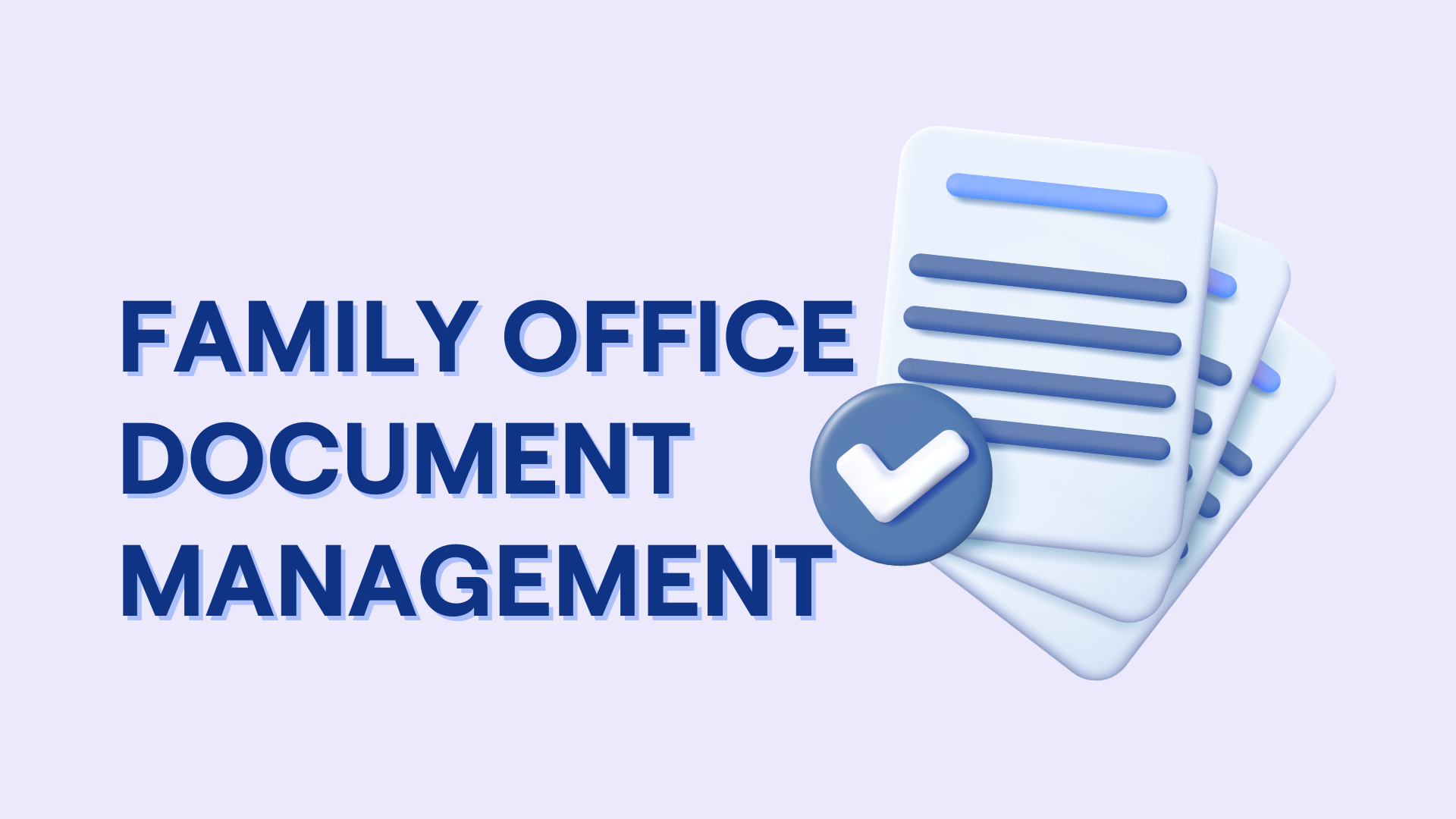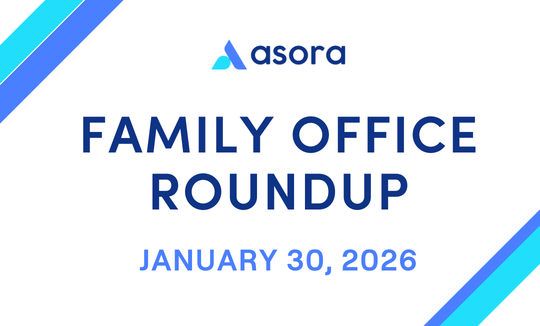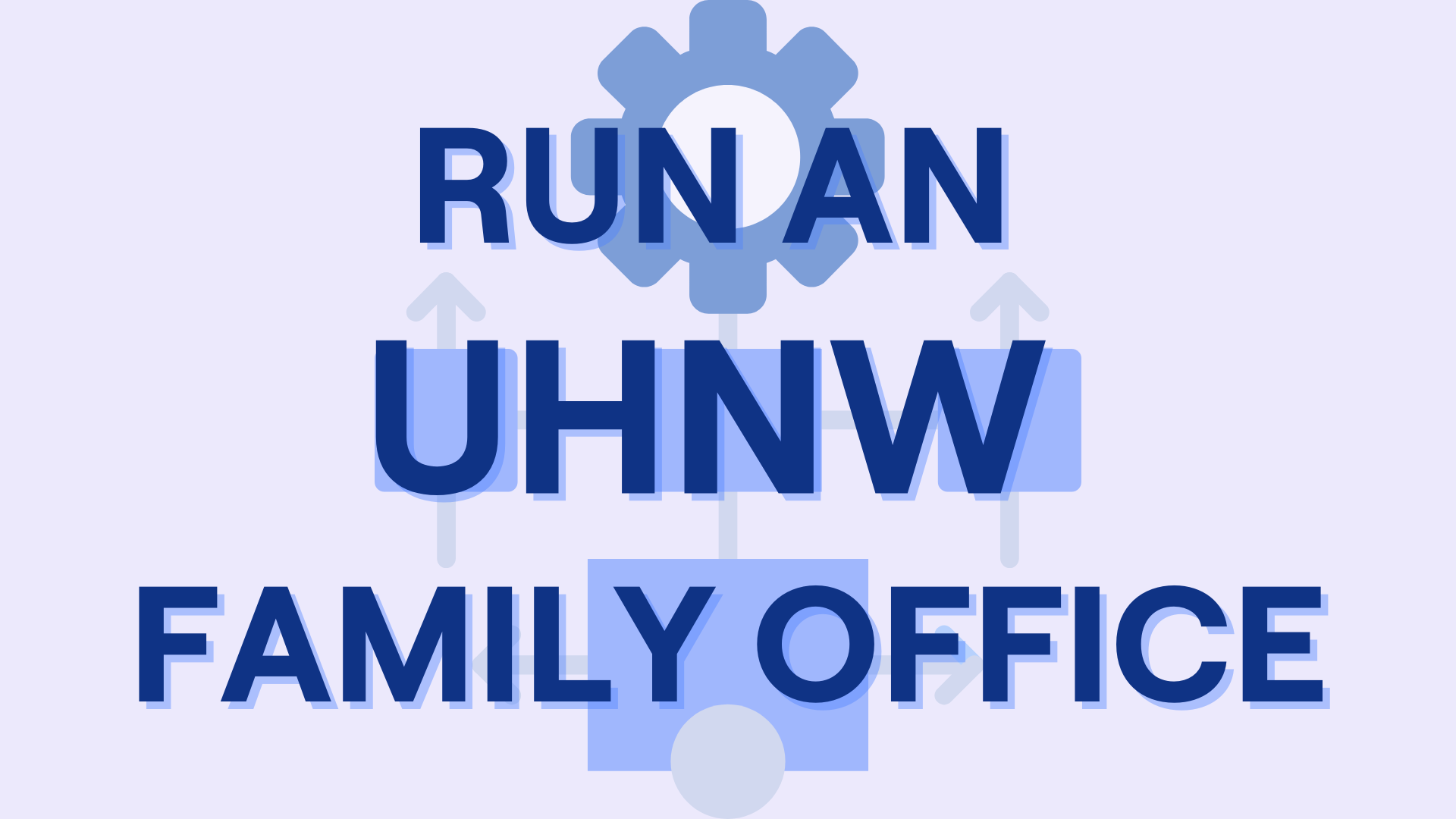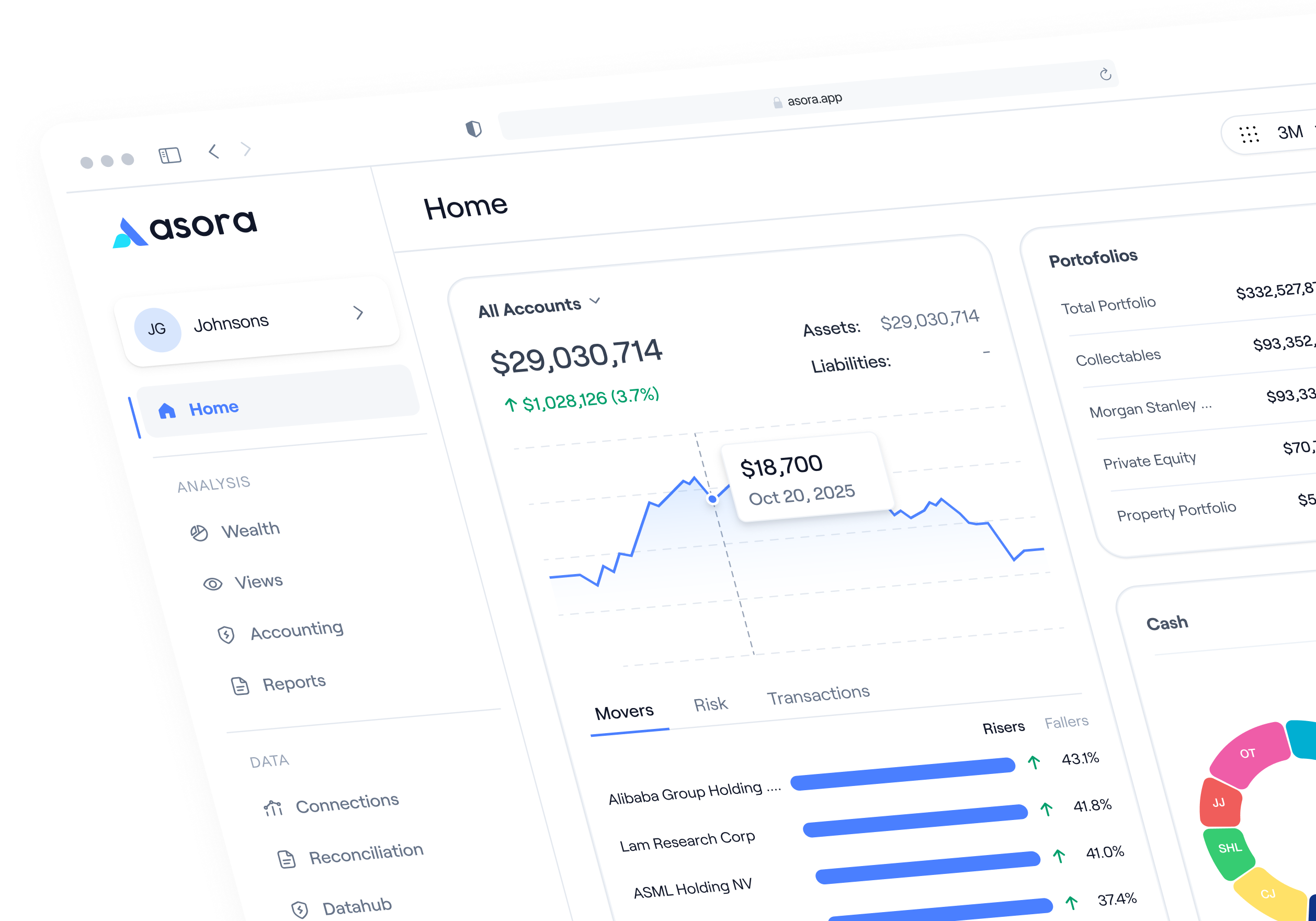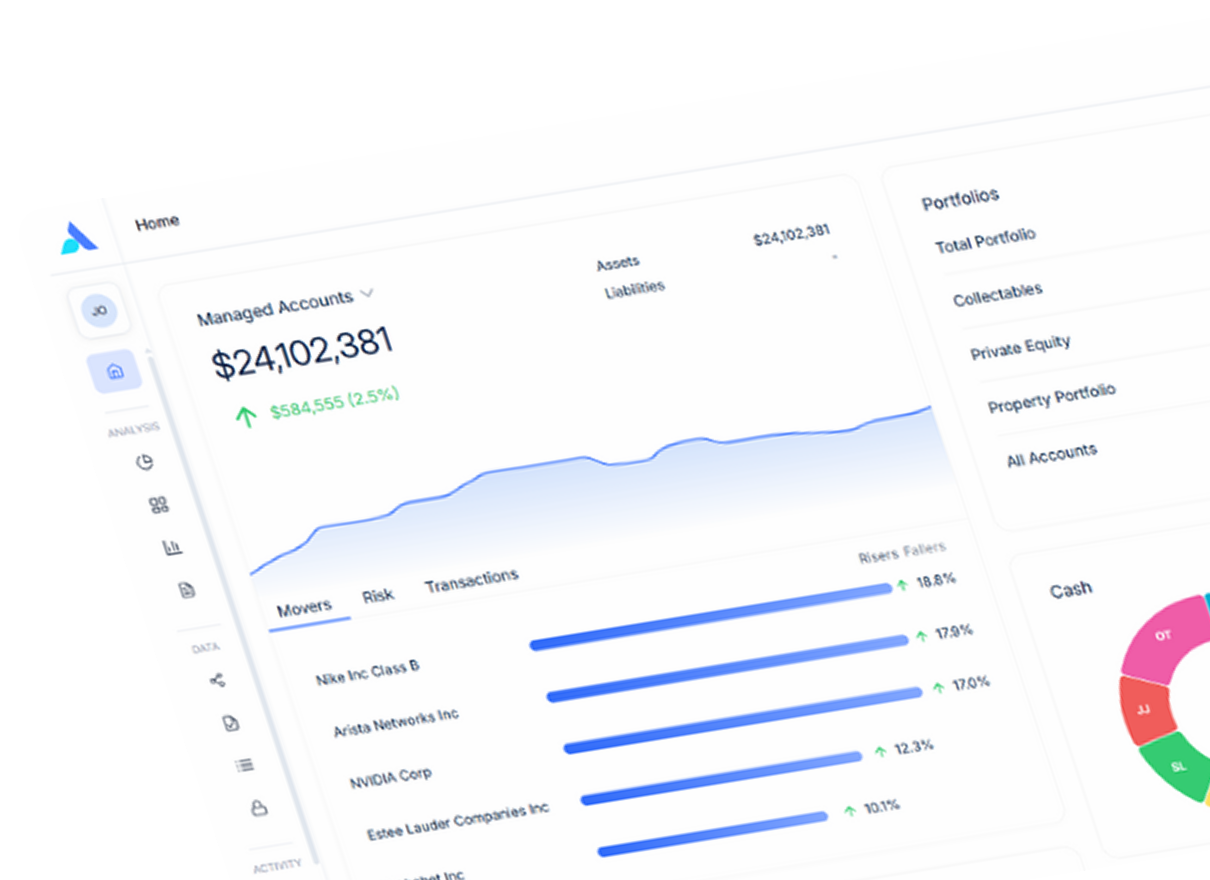Automate your family office
Schedule DemoHeading 1
Heading 2
Heading 3
Heading 4
Heading 5
Heading 6
Lorem ipsum dolor sit amet, consectetur adipiscing elit, sed do eiusmod tempor incididunt ut labore et dolore magna aliqua. Ut enim ad minim veniam, quis nostrud exercitation ullamco laboris nisi ut aliquip ex ea commodo consequat. Duis aute irure dolor in reprehenderit in voluptate velit esse cillum dolore eu fugiat nulla pariatur.
Block quote
Ordered list
- Item 1
- Item 2
- Item 3
Unordered list
- Item A
- Item B
- Item C
Bold text
Emphasis
Superscript
Subscript
TL;DR
Effective family office document management is no longer back-office housekeeping. It is the operating spine that supports consolidated reporting, clean audits, and faster, more informed decisions. Centralize records in a secure vault, link every file to the entity, account, and asset it validates, and run approvals and task management in the same workspace. With Asora, family offices connect documents to portfolios and workflows, combine data aggregation across banks and custodians with look-through views for private assets, and keep everything available on mobile for principals, wealth managers, and legal counsel.
The Growing Stakes For Modern Family Offices
As family offices expand, the paper trail multiplies across entities, jurisdictions, and asset types. A single family office may manage an entire portfolio that includes bank accounts, marketable securities, private equity, venture capital, real estate, operating companies, and trusts. Each holding is supported by legal documentation, including subscription agreements, side letters, capital call and distribution notices, K-1s, and workpapers for tax planning, as well as trust instruments, board minutes, and insurance policies. When these records are stored in emails or disorganized folders, financial reporting slows down, regulatory compliance becomes more challenging, and data protection is compromised.
A disciplined approach to document management yields immediate benefits. Teams stop debating "which version is final," investment managers can verify terms before recommending a trade, and principals see the same evidence their financial advisor and legal services team rely on. The result is improved family office operations, enhanced risk assessment, and a smoother path to informed investment decisions across the entire investment portfolio.
Why Traditional Tools Fall Short
Spreadsheets and generic file shares often fail to meet the demands of a family office's complex structure. Version sprawl undermines accurate reporting; access is difficult to scope by entity and role; and the connection between a number and the paper that proves it breaks at the worst time. Heavy enterprise systems often overcorrect with a slow rollout and separate logins that discourage adoption. A modern approach prioritizes the basics: keep everything in one integrated platform, anchor documents to the data they inform, enforce permissions by role and entity, and enable people to work from a single map of records, approvals, and custom reports. That is how modern family office solutions drive operational efficiency without adding friction.
How Better Document Management Improves Investment Decisions
Documents and data are two sides of the same record. Link the side letter to the fund position, and you can confirm gates, notice periods, and concentration limits before making an allocation. Attach property files to depreciation schedules, and you tighten tax strategies and tax considerations. Store trust instruments with distribution approvals, and you protect family cohesion when succession planning becomes real. When files and figures coexist, wealth management, portfolio management, and investment management all operate from the same facts. That shared source of truth shortens meetings, clarifies investment strategies, and helps families assess risks, mitigate risks, and act with confidence when markets move.
6 Best Practices For Family Office Document Management
Effective document management underpins audit readiness, facilitates faster closings, and reduces operational risk. The practices below centre on a governed vault tied to your data model, consistent naming and retention, in-context workflows, right-sized access with activity history, secure mobility, and explicit links between legal/tax documents and the calculations they drive.
1. Centralize Storage With Context
Build a secure vault that mirrors the data model you use every day, including entities, accounts, assets, and instruments. In Asora, documents are linked directly to entities, assets, or accounts, so the subscription, valuation memo, or wire instructions are one tap from the position they support. This design simplifies compliance maintenance and accelerates financial reporting during the close.
2. Standardize Naming, Tagging, and Retention
Agree on clear conventions. Tag by entity, manager, strategy, asset allocation bucket, effective date, and sensitivity. Set retention schedules for bank advices, board packs, and trust materials. Consistent labeling turns a vault into a searchable knowledge base for principals, staff, and family members who participate in governance across family office types, including multi family offices and virtual family office models.
3. Keep Work and Evidence Together
Approvals should never drift away from the documents they reference. In Asora, tasks and workflows are linked to the relevant asset/account, so a capital call task includes the notice, settlement details, and entity context. That keeps reviews tight and helps investment professionals and wealth managers move from "request and wait" to "open and verify."
4. Right-size Access and Log Activity
Grant permissions by role and entity, require strong authentication, and review access on a quarterly basis. Keeping documents within the platform, rather than circulating attachments, strengthens data security and data protection while providing family offices with access to what they need without overexposure. Activity history makes legal counsel and auditors more efficient.
5. Design for Mobility Without Losing Control
Principals and advisors should retrieve files securely on iOS or Android before a meeting, rather than searching through email. Asora's mobile apps provide timely data and documents without sacrificing controls, which is crucial when business operations span multiple time zones and decisions cannot wait for desk time.
6. Connect Legal, Tax, and Investment Records
Partnership agreements drive waterfalls and capital accounts. Trust deeds govern distributions and gifts. Property files roll into depreciation and basis. Bank confirmations tie to reconciliations. When each document is linked to the calculation it affects, investment performance, tax liabilities, and transfer wealth considerations start from the truth, not a guess.
Technology That Fits the Modern Family
The best family office software integrates documents, portfolios, and workflows into a single, seamless platform. Asora takes a pragmatic approach for the modern family office, featuring a Document Vault linked to the records you use daily, portfolio management capabilities with look-through across entities, data aggregation from banks and custodians, tracking for commitments, capital calls, and distributions on alternative investments, as well as secure mobile access. You get the clarity of a unified view without juggling multiple investment platforms or disconnected portfolio management systems. For high-net-worth families and individuals, this balance of coverage and simplicity reduces vendor sprawl, streamlines document management, and keeps attention on the family's goals.
Implementing the Program: From Mapping to Measurement
Start with a short mapping exercise. List entities, accounts, and financial instruments, then enumerate the documents that support them: subscriptions, side letters, bank confirmations, entity registers, trust instruments, valuation memos, and the latest capital call and distribution notices. Set conventions for names, tags, and retention, and agree on a permission model that reflects who needs to see what across the single family and advisor network. Migrate the documents that drive the most requests first and link each file to its record.
Next, bring the work to the documents: create task templates for capital calls, distributions, valuations, and wire updates with the required evidence attached. Replace attachments with links so everyone works from the vault.
Finally, measure what matters. Most offices aim for a sub-5-minute median document retrieval time, a <2% missing-document rate per quarter, and a 95% on-time completion rate for document-linked tasks. Track retrieval time, missing-document rates, days to close by entity, and on-time completion rates for document-linked tasks. If a trend slips, fix the workflow rather than adding more folders.
Cybersecurity for Sensitive Records
Many family offices underestimate the attractiveness of their records to attackers. Multi-factor authentication, encryption in transit and at rest, least-privilege permissions, and link-based sharing are the baseline. Habits matter just as much: keep documents stored in the vault, and conduct regular phishing drills so staff can recognize standard lures. When the system that stores files also manages access and activity, the gap between detecting a risk and resolving it narrows, and that is where absolute protection resides.
How Better Documents Improve Reporting and Planning
Cleaner document foundations improve everything upstream. Consolidated reporting becomes credible because every figure is traceable to its source. Custom reports land faster because the evidence is already organized. Tax implications and tax liabilities are easier to model when returns, statements, and ownership documents are readily available. Investment advice has a firmer footing when mandates, side letters, and liquidity terms are at hand. And when family offices re-underwrite managers or rebalance their asset allocation, they do it with the same set of facts that their advisors and auditors will later test.
Final Thoughts
Clean, connected family office document management turns complexity into control. Centralizing records, standardizing their naming and retention, and placing approvals and tasks alongside the documents they reference creates a single source of truth for portfolio management, financial reporting, tax planning, and governance. Pair that discipline with an integrated platform that links documents to entities, accounts, and assets, provides look-through transparency, and delivers real-time data on mobile, and you get tangible outcomes: faster closes, smoother audits, fewer fire drills, and more time for informed decisions on allocations and managers.
If your office is ready to replace the paper chase with clarity, see Asora in action and decide if it fits your family's goals.
FAQs
What documents should a family office prioritize first?
Begin with the records that drive routine requests and calculations, including subscription agreements and side letters for private equity and other alternative investments, capital call and distribution notices, valuation memos, bank and custodian confirmations, entity registers and resolutions, and trust instruments. Organizing these into a structured vault enhances financial reporting and streamlines audits.
How does a centralized vault help with compliance and security?
When every file is linked to its corresponding entity, account, or asset and shared through the platform, data security and maintaining compliance become integral to daily work. Permissions are enforced by role, activity is visible, and retention policies are easier to uphold, all of which support regulators, auditors, and legal counsel.
Can Asora handle both private assets and bankable securities?
Yes. Asora treats private assets as first-class, so SPVs, partnerships, and directs sit alongside listed holdings. You can track commitments, capital calls, and distributions, view exposure across funds and direct investments, and open the documents that prove each step from the same screen. This is particularly useful for investment managers and wealth managers who need context before recommending moves.
Where do portfolios and documents meet in day-to-day work?
In Asora, documents are stored alongside portfolios and tasks. This means that a change in allocation policy, a new capital call, or a distribution approval is tied to the evidence, thereby improving portfolio management reviews and reducing cycle time for investment decisions across multiple family office types.
Will this help a virtual or multi-family office model?
It does. Whether you run a virtual family office, a single family office, or support multiple families, linking documents to records and enforcing role-based access provides distributed teams with the same advanced technology and structure that larger firms use without the overhead.

